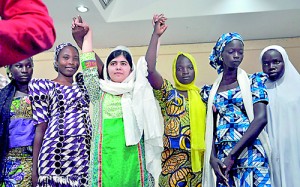Sunday Times 2
Pakistan’s Malala, global icon of girls’ education
View(s):ISLAMABAD (AFP) -Schoolgirl activist Malala Yousafzai’s courageous fightback from being shot by the Taliban has transformed her both into a symbol for human rights and a campaigner in global demand.
Few teenagers can say they have been nominated twice for the Nobel Peace Prize, or spent their 17th birthday lobbying Nigeria’s president to do more to free hundreds of girls kidnapped by Islamist militants.
But Malala is no ordinary teen.

Pakistani education activist Malala Yousafzai (3rdL) raises her arms as she poses with five escaped Chibok school girls after giving a press conference in Abuja, Nigeria (AFP)
She had already been in the public eye for years when a Taliban gunman boarded her school bus on October 9, 2012, asked “Who is Malala?”, and shot her in the head.
Her father Ziauddin, a school principal and himself a seasoned campaigner for education, helped propel the precociously talented girl from the Swat valley in northwest Pakistan into the limelight.
At his encouragement, Malala started writing a blog for the BBC’s Urdu service under a pseudonym in 2009, aged just 11, about life under the Taliban in Swat, where they were banning girls’ education.
In 2007 the Islamist militants had taken over the area, which Malala affectionately called “My Swat”, and imposed a brutal, bloody rule.
Opponents were murdered, people were publicly flogged for supposed breaches of sharia law, women were banned from going to market, and girls were stopped from going to school.
Her blog, written anonymously with the clarity and frankness of a child, opened a window for Pakistan onto the miseries being perpetrated within its borders.
But it was only after the shooting in 2012, and Malala’s subsequent near-miraculous recovery in a British hospital, that she became a truly global figure.
She has since become something of an international star, a formidable, and instantly recognisable force for rights.
She received a standing ovation in July 2013 for an address to the United Nations General Assembly in which she vowed she would never be silenced.
In an interview in 2013 with CNN’s Christiane Amanpour at a sold-out public event in New York, Malala said she wanted to become prime minister of Pakistan to “save” her country.
But her activism has continued. During her 17th birthday earlier this year she was in Abuja, pushing president Goodluck Jonathan to meet with the parents of hundreds of girls who had been kidnapped by the Islamist group Boko Haram.
On Friday, Pakistan’s military said they had arrested 10 suspected Taliban militants accused of being involved in the murder attempt against her.
But bringing the men to trial will likely be a long process. In Pakistan’s sclerotic legal system, cases grind through the courts for years making little progress.
The Pakistani Taliban’s new hardline Jamat-ul-Ahrar faction, meanwhile, denied the military’s claims, saying of the three men responsible for trying to kill Malala, one is dead and the other two are currently at large.

